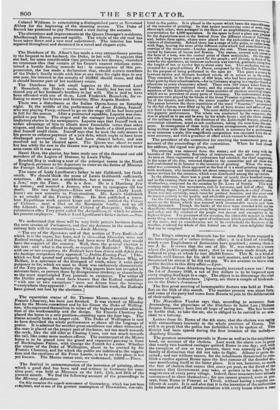The festival in commemoration of the invention of printing, about
which a good deal has been said and written in Germany for some time past, was held at Mayence on the 14th, 15th, arid 16th of the present month. We find the following account of the proceedings in the Morning Advertiser.
On this occasion the superb monument of Guttemberg, which has just been completed, and is one of the greatest masterpieces of Thorwaldsen, was exhi- bited to the public. It is placed in the square which hears the venerable:1mo,--. of the inventor of printing. In that square semicircular rows of seats, ri,;„, above each other, were arranged in the form of an amphitheatre, containieg k.: commodation for 4,000 spectators. In the space in front a place was prepand for the deputations sent to the festival from the different towns of Getnian,, and, before them again, chairs were placed for the authorities of the city visiters of distinction. Behind there was a range of lofty poles, or rather motto, with flags, bearing the arms of the different cities which bad contributed totIK erection of the monument—London among the rest. These masts were eds. nected by festoons of leaves and flowers. The statue, covered with canvuio the form of a tent, was the central point of these semicircles. On the °pp,. site side a large space was set apart for the people; and directly in front of the seats for the spectators, an immense orchestra was erected, gradually rising from the height of ten or twelve feet to about sixty feet. This orchestra was coo. structed for a grand military Te Deem, composed by the Chevalier Neukornot fur the purpose of being performed in the open air Thia piece was sung by between twelve and thirteen hundred voices, all in unison or in the oeCote. They consisted, in the first part, of 630 boys, who had been previously taught their parts by their schoolmasters,—for in Germany singing is a regular branch of education in every elementary school. There were 180 voices taken from the Prussian regiments stationed there; and the remainder of the singers were members of the Leidertafel, one of those societies of amateur convivial singers which are so prevalent in many parts of Germany. The instrumental access paniments were played by the bands of the three Prussian regiments, the cram tra of the theatre, and others; the entire number of performers being 1,500. The pauses between the three repetitions of the word " Sanctus!" pronounced by the full chorus, were filled up by the roll of forty drums and salvos of can. non fired in the most exact time. The roost skilful arrangements were made for this gigantic performance. The whole was conducted by the composer, who was so placed as to see Rod be seen by his whole forces ; and the three masters of the military bands, with the directors of the Leidertafel Society, placed in convenient situations, acted as sub-conductors, taking the time front thecae. poser. In consequence of these truly German arrangements, and of the muse being written with that breadth of style which is necessary for a performance on so immense a scale, this magnificent composition was executed u ith the ut. most accuracy, and with a grandeur of effect which cannot be described.
The president of the committee for erecting the monument gave as account of the proceedings of the committee. When he had closed his address, the signal was given, and The covering was removed from the statue; and the air rung with the hurrahs of the multitude, flourishes of instruments, and salvos of artillery. As soon as these expressions of enthusiasm had subsided, the chief magistrate, in the name of the city, returned thanks to the committee and all those who had contributed to do honour to the inventor of printing. When the monu- ment was uncovered, there appeared at the foot of it a small printing apparatus, with workmen, who immediately set about composing and throwing off sou verses written for the occasion, which were distributed among the spectators. In the afternoon, there was a great dinner of nearly three hundred coven; and in the evening there was a performance at the theatre of an oratorio called Gattemberg, composed for the occasion by Dr. Lowe of Stettin This work contains some very tine movements, rich in hut-many, and full of effect. The concluding fugue, in particular, which is on three subjects, is a chef tneurre. There was not, certainly, much room for poetical beauties, and the piece owed its success entirely to the quality and admirable performance of the music. On the Milan lug day, the 13th, there were regattas and all sorts of annu- lments on the Ithine, which was covered with innumerable vessels and boats richly decorated. Though the banks of the river were crowded with net leas than thirty-thousand spectators, every thing went on with the utmost tranquillity and milt c, and the conduct of the people was decent and exemplary in the highest degree. The greatness of the occasion, the admirable manner in which every thing was conducted, the spirit of enthusiasm which prevailed, the beauty of the now, and (a consideration not to be overlooked ) the fthenesss of the weather, rendered the whole of this festival one of the most delightful things that can be imagined.


























 Previous page
Previous page